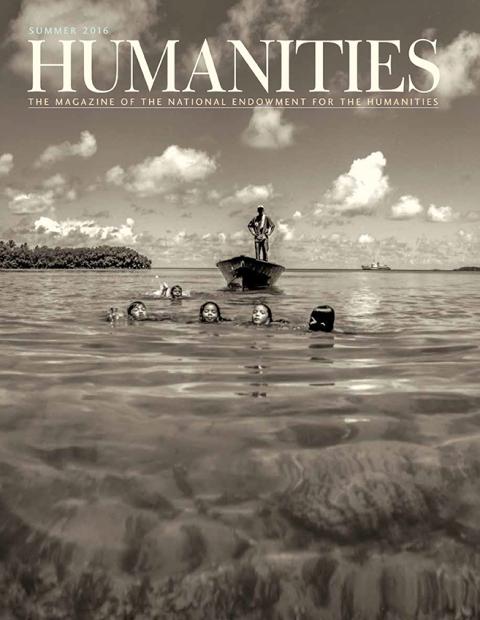A Humanities contributor recently thanked me for doing a New Yorker-style fact-check on his article. We strive for that, I assured him, thinking and knowing that this was a great compliment but realizing I didn’t know what a “New Yorker-style fact-check” was exactly. I’m not even sure I know what fact-checking is, when it comes right down to defining it.
We do know we should be accurate in terms of dates, names, quotes, and dozens of other verifiable details, and we try to respect our authors’ knowledge of a subject, offering some leeway when it comes to opinion and specialized knowledge. But an author has slipped if they’ve referred to the Mediterranean Sea, for example, as covering an area of roughly a thousand square miles. It is, rather, 965,300 square miles, as Google reveals in .86 seconds. Yet some facts have to be trusted even if they cannot be verified. The writer who is an avid Tour de France fan is likely to just know, from having pored over hundreds of copies of Miroir du Cyclisme, that two-time Tour de France-winner Laurent Fignon’s nickname was “Laurent lunettes,” which referred to his trademark wire-rimmed glasses.
In the interest of full disclosure, I admit that I am that cycling fan. I simply remember how fondly the lanky blond and bespectacled Frenchman was regarded by Tour fans for spreading out on a patch of grass and reading Proust between grueling stages of La Grande Boucle. The error regarding the Mediterranean is easily and swiftly corrected; the nickname of a French cycling star from the eighties, surprisingly, pops up rarely, if at all, in a Google search. In the latter case, you place some faith in the author’s specialized knowledge.
Who wouldn’t be flummoxed, then, when confronting what was potentially a factual slipup in copy from a trustworthy Humanities writer who’s quoting a much-loved American poet? The poet in question was Marianne Moore, who had an inimitable talent for integrating quotes of all kinds into her verse. In her poem “To a Snail,” Moore quotes the assertion that “compression is the first grace of style,” and in a footnote attributes this to the Greek philosopher Democritus. An Internet search turns up many cases where the quote is indeed attributed to fifth-century B.C.E. philosopher Democritus, and just as many times it’s attributed to fourth-century B.C.E. philosopher Demetrius. Danny Heitman, the Humanities author, correctly quoted Moore, but did Moore correctly quote Democritus? Hmmmmm . . . .
In this case, a quick e-mail to Charles McNelis in the Classics Department at Georgetown University was a good start. Just a few months earlier I had taken a graduate course on Greece and Rome with McNelis, and while we didn’t cover Democritus, we did talk about the pre-Socratics, of which Democritus was one. The quote Moore attributes to Democritus didn’t seem to jibe with pre-Socratic thought, which raised questions about the composition of air, water, and light, for example. It seemed to me that the pre-Socratics were not very interested in questions of style and rhetoric, which is what the Moore quote is all about. The latter philosopher, Demetrius, was much more likely, given the times he lived in and his contemporaries’ interest in rhetoric, to have expressed the thought Moore quotes. McNelis concurred that this was probably the case. This was confirmed when the quotation was found in a translation of Demetrius’s writing on rhetoric alongside the original Greek.
A literary mystery still seemed to be brewing. Did Moore herself ever realize the error? What could explain the slipup in the first place, and why was it perpetuated? Towering figures in American poetry such as Donald Hall have repeated the quote and attributed it to Democritus, as did Grace Schulman in her endnotes to The Poems of Marianne Moore.
Linda Leavell’s biography of Moore—the NEH-funded Holding On Upside Down—quotes Moore writing after her midyear exams in college, “I cannot remember dates and I never seem to express myself clearly.” Perhaps Moore read and absorbed material quickly but sometimes erred in the details. She had a quick mind and an incredible ability to make astute and creative associations. One wonders, too, if there was a mild form of dyslexia to blame. Perhaps not, but Leavell writes, “She did have an ineptitude with numbers. Filling out a scholarship application, she could not remember the year she was born and calculated it to be 1885 instead of 1887; told that her height was 5’4”, she wrote it as 4’5”.” Leavell writes that “today she might be diagnosed with a learning disability, dyscalculia. The disability could explain not only her confusion of dates but also her difficulty putting ideas and events in the proper sequence.”
Moore eventually realized the error in attributing the quotation to Democritus. According to scholar Pat Willis, who wrote to Leavell by e-mail, “MM did cite Democritus in Observations. But that was the last time. In SP [Selected Poems] she offers 'compression is the first grace of style. The treatise by Demetrius Phalereus, or a later Alexandrian?'" And, Willis continues, “in a note she made to herself for a reading at MoMA, 28 February 1950, she wrote: ‘I have been asked to read TO A SNAIL which is a commentary on Demetrius’ statement that THE VERY FIRST GRACE OF STYLE IS THAT WHICH COMES FROM COMPRESSION.’”
One lesson for fact-checkers from all of this may be that it can take a while to get it all right. Sometimes decades.

